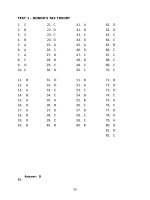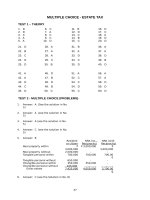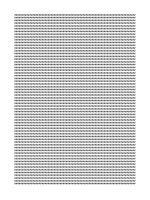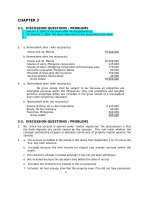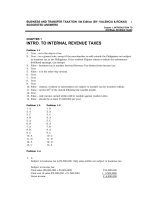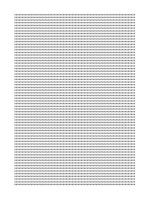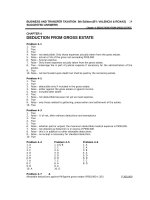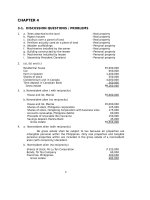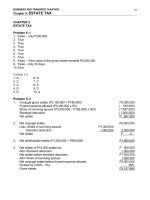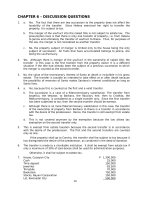Transfer and business taxes by ampongan 6th sol man 6
Bạn đang xem bản rút gọn của tài liệu. Xem và tải ngay bản đầy đủ của tài liệu tại đây (36.29 KB, 2 trang )
CHAPTER 6 – DISCUSSION QUESTIONS
1.
a.
Yes. The fact that there are two successors to the property does not affect the
taxability of the transfer. Since Helena exercised her right to transfer the
property, it is subject to tax.
b.
The merger of the usufruct into the naked title is not subject to estate tax. The
presumption here is that there is only one transfer of property, i.e. from Helena
to Janina and ultimately the transfer of usufruct to Diana. Thus, for purposes of
the law, the merger is not considered as another transfer.
c.
No, the property subject of merger is limited only to the house being the only
subject of succession. All fruits that have accumulated belongs to Janina, she
being the usufructuary.
2.
Yes. Although there is merger of the usufruct in the ownership of naked title, the
transfer in this case is the first transfer from the property owner. It is a different
situation if the title had already been the subject of a previous succession to which
the merger is counted as the second transfer.
3.
No, the value of the reversionary interest of Santo at death is includible in his gross
estate. The transfer is taxable as intended to take effect at or after death because
the possibility of reversion of Santo makes Santana’s interest conditional as long as
Santo lives.
4.
a.
Yes, because this is counted as the first and a valid transfer.
b.
The succession is a case of a fideicommissary substitution. The transfer from
Angelica, the testator, to Barbara, the fiduciary heir, then to Criselda, the
fideicommissary, is considered as a single transfer only. Since the first transfer
has been subjected to tax, then the second transfer should be exempt.
c.
Although there is no more fideicommissary substitution in this case, the transfer
of the ownership of property from Barbara to Diana is a transfer in accordance
with the desire of the predecessor. Hence, the transfer is still exempt from estate
tax.
d.
This is not covered anymore by the exemption because the law allows tax
exemption on the second transfer only.
5.
This is exempt from estate taxation because the second transfer is in accordance
with the desire of the predecessor. The first and the second transfers are counted
only as one.
If the property shall go to Concha, the transfer shall be subject to tax because it
has disregarded the desire of the predecessor, as contained in the deed of donation.
6.
The transfer is made to a charitable institution. It shall be exempt from estate tax if
only a maximum of 30% of said devise shall be used for administration purposes.
Otherwise, it shall be subject to estate tax.
7.
House, Cauayan City
Cash
Time deposit
Jewelries
Trimobile
Bookstore
Stocks, Bayani Corporation
Lot, Koronadal City
10
P 1,300,000
25,000
150,000
83,500
70,000
750,000
150,000
500,000
Gross estate
P 3,028,500
Notes:
1. The pineapple plantation is a case of a merger of usufruct in the owner of a
naked title. It is exempt from estate tax.
2. The antique collections are the subject of a fideicommissary substitution.
Therefore the transfer is exempt from estate tax. Moreover, it is a case of special
power of appointment; hence, not includible in the gross estate.
3. The time deposit with Chinabank is a donation to charitable institution to be used
exclusively for public purposes. Hence, exempt from estate tax.
4. The dividends declared by Bayani Corporation shall not be subject to estate tax
because the decedent died before the date of record.
11
